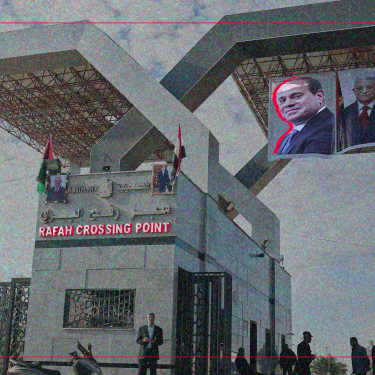RSF investigation : How Egypt is complicit in reporting blockade on Gaza

Egypt accuses the international media of a pro-Israeli bias in their coverage of the war between Hamas and Israel but, at the same time, it has been preventing journalists from entering the Gaza Strip via the Rafah border crossing, which is supposedly under its control. This double game assists the reporting blockade that Israel has imposed on the Palestinian enclave, says Reporters Without Borders (RSF), reiterating its call for Egypt to open Rafah’s gates.
In an unusually frank comment to the media on 16 November, of which RSF has obtained an audio recording, Egyptian Foreign Minister Sameh Shoukry said “any unilateral action” by Egypt as regards letting journalists into Gaza might be seen [by Israel] as “inappropriate” and might “have adverse consequences to other components” of the arrangement between Egypt and Israel, such as “the entry of assistance.”
Has humanitarian assistance been used as a form of blackmail? Does the Minister just want to avoid offending Israel? Either way, Egypt seems to have no intention of opening the Rafah border crossing for journalists, despite the demands of RSF and many journalists in Egypt.
In the course of our investigation, several Cairo-based journalists confirmed that they had been told to request Israel’s agreement if they wanted to enter Gaza via the Rafah border crossing, although this crossing is supposed to be under the control of the Egyptian authorities. Those journalists who did seek Israel’s permission were refused.
RSF has obtained an audio recording of the response that an Israeli press spokesperson gave to a journalist who requested a permit to enter via Rafah. She said she could not issue permits for a crossing point that is not under Israeli control and, referring to what the Egyptians are telling journalists, she said: “I have the impression it’s just a pretext. I think they’re making you go round in circles.”
According to a source inside the Gaza Strip who knows this crossing point well, it is definitely Egypt that controls entries and exits through Rafah. But Israel controls the skies. Israel’s bombing and shelling of the Rafah border crossing in the days following the 7 October attack were seen in Cairo as a warning to the Egyptian authorities against any attempt to use the border crossing in a manner contrary to Israel’s interests.
“This buck-passing between Israel and Egypt, in which each blames the other for the denials of access, shows that the two governments have a mutual interest in preventing international media coverage of the situation in the Gaza Strip. Israel is primarily responsible for this news blockade, but Egypt has continued to be complicit in recent weeks. You cannot pretend to deplore bias in the media’s coverage of the war while at the same time preventing journalists from going there.
Egypt has played this double game skilfully since the start of the war, accusing the international media of biased coverage while blocking access and blaming Israel. During a press briefing on 24 October, government spokesperson Diaa Rashwan accused the international media of “humanising the Israeli situation and demonising that in Palestine.”
A week later, in an attempt to defuse the growing criticism of this double talk, a press trip was organised through Sinai to the Rafah border. Around 100 Cairo-based Egyptian and foreign journalists were given a closely-supervised bus outing and were not allowed to cross the border. It was totally inadequate.
On 16 November, 67 foreign media correspondents requested the opening of the Rafah crossing in a letter to the government spokesperson and to the director of the press center for foreign media. The letter remains unanswered and the situation remains unchanged.
Egypt’s foreign ministry and the government’s spokesperson did not respond to RSF’s questions.
Historically hard to access border for reporters
“There is a culture of censorship, especially in this part of Sinai at Palestine’s gates, that pre-dates the attack by Hamas,” said a journalist based in Egypt for the past ten years who asked not to be identified. The area is regarded as highly sensitive and any coverage of subjects concerning it is capable of eliciting an exaggerated reaction from President Abdel Fattah al-Sisi’s government.
Mada Masr news website editor Lina Atallah was summoned for a hearing before the Supreme Media Regulatory Council on 29 October followed by an interrogation by the Cairo appeal court prosecutor’s office a month later because Mada Masr had issued an article about potential economic impact on Egypt of an influx of Palestinian refugees via the Rafah crossing. The website was suspended for six months.
